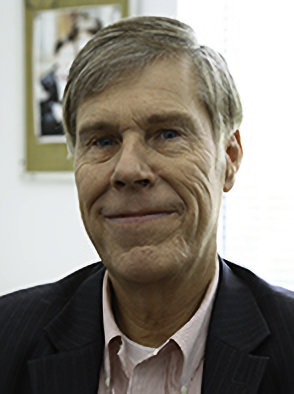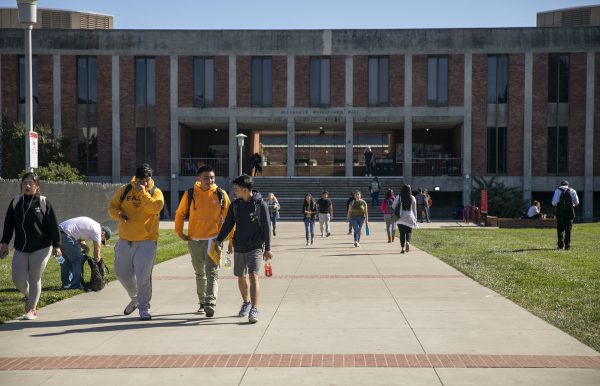Academic Senate Votes to Censure Eugenics Professor
November 19, 2020
The Academic Senate of California State University, East Bay has passed a resolution to censure Gregory Christainsen, an Economics professor whose teaching and published work claims that most people of color are intellectually inferior.
More than 100 participants joined the Senate meeting Nov. 17 on Zoom, a large majority of them being guests, quietly waiting to hear the outcome of the resolution of censure.
The Senate voted to pass the resolution relating to Christainsen’s use of pseudoscience and so-called “race realism,” which is a debunked field of study based on eugenics. The ideology behind eugenics suggests that certain races are biologically inferior to others. Christiansen has argued in his classes and published work that white and Asian people are intellectually more advanced than Black and Latinx people. The resolution of censure argues that Christainsen has abused academic privilege, and includes excerpts from his published articles. It is written in sets of terms that the Senate demand these actions be taken:
CSUEB Academic Senate disapproves of Christainsen for taking part in “fundamentally racist scholarly activity” during his employment at CSUEB, requests that he abstain from any further academic discourse and publications, and strongly urges that he no longer teach at the university.
CSUEB Academic Senate requests that an investigation be held by appropriate members of the University administration, appointed by the University President, to determine whether the “race realism” publications (referred to in the resolution) were included in his submitted materials to be reviewed by the respective committees when deciding to grant tenure, promotion, and emeritus status to Christainsen.
And lastly, should the University administration find that to be true, the Senate urges the University President to revoke the status of emeritus professor.
Emeritus status is a designation at California State University, East Bay and other universities to honor retired faculty, to encourage their continued association with the University, and to provide, where possible, for the continued pursuit of their scholarly interests.
CSUEB President, Leroy Morishita, issued a memo to the campus community on Nov. 2 stating that, “while we understand the sentiments underlying these demands, as a public institution of higher education, we are bound by the First Amendment of the United States Constitution, which guarantees free thought and speech.”
The heat of the backlash to Christainsen’s work can be felt as CSUEB students speak out against racially biased academic practices.
MyKale Clark, College of Letters, Arts, and Social Sciences Senator for Associated Students Inc, addressed the Senate.
“We as CSUEB, priding ourselves on commended diversity, simply, committed to anti-racism and equity on this campus and have been appalled to learn that this has passed as meritorious research and that students have been subject to learning defective, racist theories in Prof. Christainsen’s classroom,” she said.
“I firmly believe that consequences should be presented to hold our own faculty (Professor) members accountable.”
CSUEB prides itself on valuing equity, inclusivity, and being one of the most diverse schools in the country, with a large majority of students coming from Black and Latinx backgrounds. But some students say they have not seen policies that reflect those values. In an email to Senate Chair Michael Lee this month, a student said the university’s actions in the matter are unethical, and urged decisive action.
“I am concerned that the curriculum he is teaching us is biased towards his own personal beliefs,” the student said. “I am worried that the education I pay full price for is of lesser quality than I would get at another similarly priced university, or even at CSUEB with a different professor.”
The Academic Senate vote was not open to the public, however throughout the open discussion time allotted, only James Ahiakpor spoke out in objection of the resolution while the rest spoke on behalf of participating students in favor of the measure. Those in favor of the resolution emphasized the message it would send to students, a message that says students are of the utmost importance, and accountability will be upheld where it is due.
“If Christainsen were to be censured, then Dr. DeVaro [Economics Department Chair] would also have to kind of face the reckoning that he was part of what helped Christainsen succeed in his department,” Stephanie Seitz, associate professor of the Department of Management, said in an interview before the Senate vote to pass the resolution of censure. “I think we have a responsibility to not harm students, and a lot of what Christainsen has chosen to teach in his courses are in fact harmful to students, and are inaccurate and based on bad science.”
Christainsen started as a lecturer at CSUEB in 1983 and became a full professor in 1988. He then retired in 2016 and was granted emeritus status that same year. He has published numerous papers throughout his 37-year career, but it wasn’t until this past decade that his work referenced the pseudoscience, “race realism,” and IQ tests to support his conclusions.
Some of the articles that were referenced in the resolution of censure included a 2012 article titled “Biology, Immigration, and Public Policy” in the peer-review academic journal Kyklos, a 2013 article titled “IQ and the Wealth of Nations: How Much Reverse Causality?” in which he published as a recognized professor at CSUEB, and a most recent article published in June 2020 titled “Rushton, Jensen and the Wealth of Nations: Biogeography and Public Policy as Determinants of Economic Growth” in the journal “The Mankind Quarterly.”
While one senator spoke to Christainsen’s defense, emphasizing his lack of overt racism towards any non-white student or faculty, two senators, Linda Ivey and Eric Haas, said the resolution was passed on the basis of Christainsen’s academic malpractice, and not as a reflection of his character.
The Dean of the College of Business and Economics recently approved Christainsen to a position on the Chair Advisory Committee for the Economics Department, which is responsible for the hiring of professors, other staff members, and department chair. However, after the senate vote, he will no longer have the position, according to the resolution.
Official statements issued on behalf of the university that labeled this as a case of freedom of speech in which the university cannot hold professors accountable for.
Other CSUEB faculty have spoken up against the academic practices of Christainsen, saying it is not a debate over First Amendment rights, but rather an extreme case of academic malpractice and an irresponsible professor causing harm to his students.
Christian Roessler, associate professor of the Economics Department, said a number of concerned students brought Christainsen’s teachings to his attention in 2019 after they had already mentioned it to the chair of the department, Jed DeVaro.
Lawfully, DeVaro cannot speak on any actions taken in response to student complaints for confidentiality reasons.
“Whenever students have complained to me about a faculty member — any faculty member — I have always handled those complaints in accordance with university policy,” DeVaro wrote in an email. “I have never ignored them.”
However, some faculty at CSUEB are gathering signatures for a letter to Provost Ed Inch, asking that DeVaro not be reappointed as chair of the Economics Department, arguing that he has supported Christiansen and that he has used sexist language and hiring practices as chair.
Among those who say they experienced DeVaro’s sexism is Jung Sook You, associate professor of the Economics Department. In her experience, her evaluations conducted by senior faculty members were filled with demoralizing sexist comments about her physical attributes.
One example of these comments she shared was critiquing the softness of her voice means she cannot teach and should look for a job elsewhere.
“When I read those comments, of course, I didn’t really want to make them nervous, so I didn’t say that it is discriminatory, although it’s very discriminatory,” You said in an interview.
Pascale Guiton, assistant professor of the Department of Biology at CSUEB, has advocated for anti-racism to be taught in the classroom and has worked in programs to help young Black scientists succeed in the field.
“It’s not just bad teaching, it’s about having a system that allows somebody like that [Christainsen] to be able to evaluate people like me, knowing that this person has these racial biases,” Guiton said in an interview.
Guiton is from sub-Saharan Africa, a region Christainsen concluded to have smaller brain size and lower IQs amongst its people than those of North-Asian and European descent, as written in his 2020 article “Rushton, Jensen and the Wealth of Nations: Biogeography and Public Policy as Determinants of Economic Growth” in a journal titled “The Mankind Quarterly.”
Genetic research has determined that racial categories cannot be biologically defined because of the genetic variation within these socially constructed categories, according to an Op-Ed written by faculty of the Department of Human Development and Women’s Studies. Any claim to the contrary attempts to legitimize the reasoning behind justifying racism and the notion of how some races believe they are biologically superior, the Op-ed stated.
Guiton said her main concern is for students and faculty of color on campus.
“I don’t care if Christainsen goes on top of his roof and yells that black people are stupid. I don’t care if he thinks that, I don’t care about that at all. Have your opinion, whatever, but you do not get to teach that as if it was facts; you don’t get to do that.”
















